#201 Peter Trower (1930-2017)
November 13th, 2017

A GATHERING TO REMEMBER AND HONOUR PETER TROWER WILL BE HELD FROM 3 – 6 PM AT THE FORMER LOCATION OF THE RAILWAY CLUB IN VANCOUVER ON SATURDAY, NOVEMBER 25.
THE VENUE IS NOW CALLED THE RAILWAY STAGE AND BEER CAFE. IT’S AT 579 DUNSMUIR.
Peter Trower, one B.C.’s most beloved poets, has died at age 87 on November, 10, 2017 at Lions Gate Hospital in North Vancouver. In 2015, Peter Trower had moved into the Inglewood Care Centre in West Vancouver after living mainly on the Sunshine Coast and in North Vancouver. He had a fall several weeks before his death. After surgery, he had a blood clot that led to his death.
Peter Trower, dubbed a “logger poet” early in his writing career, received the eighth George Woodcock Lifetime Achievement Award for an Outstanding Literary Career in British Columbia in 2002. In December of 2015, the town of Gibsons decided to name Trower Lane in his honour.
Peter Trower was born at St. Leonard’s-on-Sea, England, on August 25, 1930. He immigrated to British Columbia at age ten, following the death of his test-pilot father in a plane crash. He arrived on an evacuee ship with his mother and brother to stay with an aunt on Nelson Street in the West End of Vancouver. His mother married a West Coast pulp mill superintendent who drowned soon after.
Peter Trower quit school for financial reasons to work as a logger for twenty-two years. He also worked as a surveyor, smelter worker, pulp-mill hand, shakecutter and baker. He says he began writing seriously in late 1950s after an abortive fling at professional cartooning. As a writer, he fraternized with John Newlove at the Alcazar Hotel in the Sixties “and forced bad poetry upon him, some of which he was charitable enough to read.” There he also met poets Milton Acorn and Al Purdy, both influences and comrades.
Since 1971, Trower published more than a dozen books of poetry and contributed to numerous issues of Raincoast Chronicles and Vancouver Magazine. Among his supportive early influences were editor Mac Parry of Vancouver magazine and publisher Howard White. His two most important influences were his mother, Mary Cassin, who pushed him to write from an early age and critiqued his drafts until her death and Sunshine Coast writer Ted Poole. After publishing his first collection of poems in 1969, Trower quit logging and went to work for Raincoast Chronicles as an Associate Editor in 1971.
Poetry collections such as Moving Through Mystery, Between the Sky and the Splinters, The Alders and Others and Ragged Horizons have expressed his awe and resentment at the magisterial and dangerous power of nature. The Judas Hills was his third novel on the West Coast logging life, after Grogan’s Cafe and Dead Man’s Ticket.
In 2005, Peter Trower was awarded the Canadian Authors Association Jack Chalmers Poetry Award for Haunted Hills and Hanging Valleys: Selected Poems 1969–2004. Trower could start a story called Runaway Jill with this sentence, and have it be true: “It was 1965, the year I pulled rigging for Big Bart Clapperton on the risky eastern slopes of Goatfoot Mountain.”
With an introduction by Mac Parry, who published many of Trower’s stories in Vancouver magazine during that publication’s golden age, Hellhound on His Trail and Other Stories (Ekstasis $22.95) was more proof that Trower was one of the few irreplaceable talents in British Columbia writing. Trower’s coastal tales were memoirs in the realm of fiction, artfully poignant, unsettlingly from a bygone era, and eloquent with a raspy voice.
A Ship Called Destiny reflected his love and admiration for his partner Yvonne Klan of North Vancouver. It was published not long before she died.
Mike Poole made an effective documentary about Trower as a logger/poet called Between the Sky and the Splinters (1976), filmed at Jackson Bay. Alan Twigg and Tom Shandel made a CBC documentary about Trower that aired in 1985 – Peter Trower: The Men There Were Then. Trower released a music & poetry CD, Sidewalks and Sidehills, in 2003, and a collected works volume of his poetry in 2004.
*
Peter Trower, one of B.C.’s finest poets, drank often at the Alcazar Hotel in the 1960s with Milton Acorn and John Newlove when the Alcazar Hotel was a favoured hangout of writers and students from the nearby Vancouver School of Art. Trower lived in the Alcazar on numerous occasions during the period when he was a logger. The Alcazar opened in 1913 and was demolished seventy years later. Its location is now recorded with an entry for Peter Trower on the Literary Map of B.C.
Peter Trower wrote Alcazar Requiem in 1983 (excerpt):
Wind whitecapping the inlet-
rain like a whipping string-
Sea-Bus bucking and dipping-
behind us -the Alcazar, dead as a doornail.
Landmark of brick and lumber
soon to be sundered and tumbled
in a rattle of empty rooms
all of the ghosts going down in a heap.
The bar where we tippled and quipped
safe in our roles and phases
in a circus of empty chairs
the clowns are gone with a vanishing giggle.
*
And here is a poem Peter Trower wrote for his companion Yvonne Klan who died in 2004:
My Thoughts Swim After You
For Yvonne
As you drift away from me up the Coast
into adventures I cannot share
I yearn for the song of you
that magicked me into a whole person
when we laughed together
on the best days I have ever known
There was a strain in our parting –
a painful edgy awkwardness
it cuts me to recall –
words turned inadequate –
a stiff and bitter silence
dropped between us
On this warm uncertain afternoon
My thoughts swim after you
As you journey northward –
My ghost hand caresses your hair –
My ghost mouth brushes your lips –
My ghost arms close around you
Once, years ago, you moved away from me
down the windy reaches of Long Beach
before I had learned to walk with you
Then you returned and began to teach me
all the special secrets of your being
It was the first real lesson of my life
*
Moving Through the Mystery – Talonbooks – 1969
Between Sky and Splinters – Harbour – 1974
The Alders and Others – Harbour – 1976
Ragged Horizons – McClelland & Stewart – 1978
Bush Poems – Harbour – 1978
Goose quill Snags – Harbour – 1982
The Slidingback Hills – Oberon – 1986
Unmarked Doorways – Harbour – 1989
Rough and Ready Times: The History of Port Mellon – Glassford Press – 1993. With Ellen Frith
Where Roads Lead – Reference West – 1994
Hitting the Bricks – Ekstasis – 1997
Chainsaws in the Cathedral – Ekstasis – 1999
A Ship Called Destiny – Ekstasis – 2000
There Are Many Ways: Poems New and Revised – Ekstasis – 2002. Illustrations by Jack Wise
Haunted Hills and Hanging Valleys: Selected Poems 1969-2004 – Harbour – 2004
FICTION:
Hellhound on his Trail and Other Stories Ekstasis – 2009
The Judas Hills – Harbour – 2000
Dead Man’s Ticket – Harbour – 1996
Grogan’s Cafe – Harbour – 1993
[Alan Twigg / BCBW 2017]
INTERVIEW
Peter Trower was interviewed by Alan Twigg in 1978.
T: When did somebody start taking notice of your poetry?
TROWER: I met Al Purdy in 1972. We cut up in the Marble Arch Hotel one time. We were drunk and playing pool. Purdy can’t play pool worth a damn. And I don’t even try any more. So the balls were flying off the table. It had nothing to do with literature. We were just drunk in a bar.
T: You more or less had to drop out of school to go and work. Do you think your life would have been different if there had been more money around and you could have gone to a university?
TROWER: Yes, like if World War Two hadn’t happened I might have gone to Oxford or something. All my family have followed tremendously traditional paths. But the way things went down I ended up in this weird maverick situation.
T: Do you think you could have been an academic?
TROWER: No, I think I would have blown it sooner or later. I would have been an angry young man or something. I would have been involved in some haywire trip. I couldn’t have stuck that stuffy nonsense. I enjoy maverick situations. It’s like all the best writers in the world have been mavericks. Like Purdy. Or even Earle Birney, falling out a bloody tree at seventy-two years old…
T: Have there been special people for you in the way of influences?
TROWER: I used to read a lot and never paid much attention to style. I read Ray Bradbury. Early Bradbury fantasy stories were full of poetic imagery. Bradbury’s a lousy poet but he writes good prose. It’s peculiar. His book of poetry is absolutely rotten. But he was grinding stuff out for cheap pulp magazines using poetic imagery. So I began to become aware of science fiction. I had wall-to-wall science fiction stories. I read every science fiction magazine there was and I never read anything else. Then one day I woke up and the real world was still there.
T: It seems to me that some of that sci-fi has rubbed off into your poetry in that you have this mystical sense of the powers of the forest. It’s not quite science fiction but you’re very aware that there’s another world there.
TROWER: It’s what the Indians already know.
T: Exactly. Like at the close of “The Animals” you say” As the day dwindled/ the season took aim on us/ and the animals knew.” Then again there’s another bit in “Booby Trap” where you’re falling a tree and it just misses killing you. You say, “around us the woods hiss disappointment.”
TROWER: I’ve heard some strange stuff happening with guys falling trees. There’s a story I haven’t written about yet. I came to this camp and a guy had been killed just a couple of weeks before. He got pinned between the butt of a tree and the stump. He was a very tidy guy. As he was dying, because he was already cut in half, he took out all his ID and put it all out on the edge of the tree that killed him. When they finally found this guy all bust open, there was no blood on any of his ID.
T: Do you usually write from an incident like that or does it come from a phrase that sparks you?
TROWER: I write totally from real life. I don’t build words from words. Like there’s a poem in Ragged Horizons about a little girl dying of cancer. That comes right out of a heavy-duty real experience. It was unbelievably heavy. For years I couldn’t even write about it. But I thought, dammit, I better write about it. .The first poem I ever wrote that was any good was “Grease for the Wheels of Winter.” I was just trying to describe leaving the camps. It was a heavy thing because they’d been my life. It was always where I ran away to when nothing went right. The danger incidence was starting to close in on me. It was like I better quit this before I get killed.
T: Do you ever take your poems and, songs to the camps and read to working-class guys?
TROWER: I haven’t done it yet. I’ve often wondered about that. The young dudes might like it, but some of those old guys might think I was some kind of smartass. I made this film a few years ago called Between the Sky and the Splinters when we went into a logging camp called Jackson Bay. I had to act in this film. All my life I’ve been waking in bunkhouses, putting on cork boots. This time I woke in the morning, and instead of being a logger I was an actor. It was weird. The guys in the camp started looking at me like I was some phoney-baloney. I’d come back to play the part of myself when I was young in a logging camp where they were doing it for real. I went through some funny head changes.
T: You mentioned earlier that you’re going to move uptown now. What do you mean by that?
TROWER: I mean, man, I’m going to maybe quit being broke. But I ain’t going to change my way of living. I don’t like staying in fancy hotels with a bunch of smart ass TV people. I’ll stay around here, or the Marble Arch or the Cecil.
T: Where did the title Ragged Horizons come from?
TROWER: It’s just a title. I thought certain mountains I’ve seen look like they’ve ripped through the sky. And also I thought of being raggedy-assed in the street. It’s a double trip. But if I think about all that it means I can’t explain it. I don’t know, many times I thought I would never make it. Like that suicide poem about the Marble Arch is a true poem. There ain’t nothing in that book that’s BS. There’s no place in that book where I can’t drag out some old dude from the past to verify it. That’s what scares them back east. Mostly back there it’s games-playing.
T: In “Kisses in the Whiskey” you wish you “could be that ignorant again/ embark on some old sophomoric fling/ far too callow to understand/ that life is other than a Friday thing.” Does that bother you, that you feel like you’ve gone beyond your youth?
TROWER: Not really. I can look back at myself walking down the street when I was nineteen and I was stupid. Very naive. But I ain’t even finished growing up yet. Anybody who thinks they have is really dead. Everybody’s just a kid growing old.
T: What was it like when you were young in Vancouver?
TROWER: It was heavy. Maybe it’s just as bad now but it’s not organized. There were actual kid gangs. You could get in trouble just by walking into the Marble Arch Hotel at the wrong time. In those days it was more structured. There was a book called The Amboy Dukes and everybody was copying that. Big rumbles with gangs from the next district. It was heavy, even though it was all bogus.
T: Were you a real part of that scene?
TROWER: I was always an observer, sort of neutral. In those days I couldn’t talk to anyone. It was a redneck era. I used to go to bars, man, and sit down at a table but all people could talk about was hockey games and work. Boring stuff, I’d get so bored, man, I’d just OD on beer and slide under the table.
T: Are you ambitious for yourself?
TROWER: I want the books to sell. I put everything I got behind them. I can still write from the gut. I hope I don’t get soft and start writing from the mind. I went through that once but it all came out crap. I have to use experience. I’ve read a hundred books of poetry by people who purport to know what’s going on in the universe. It’s just a bunch of fakery. I’m just fed up with academic trips by people who think they know what’s going on. Nobody knows what’s going on. If you said I had a fierce drive for success, it would be true. I’ve wanted to make it but I kept getting kicked in the face.
T: Does a poem happen for you in an hour or in a couple of days?
TROWER: It can take twenty years. That poem “Atlantic Crossing” took twenty years. I couldn’t get it across because a lot of what I write about is melodramatic in the material itself.
T: So that’s one of the key things about your poetry then.
TROWER: Right. The hardest thing is to get the balance between melodrama and reality. If you go over the edge with melodrama, as I frequently have, you end up with Robert Service. Someone once told me I was a cross between Dylan Thomas, Robert Service and William Burroughs. I don’t know.
T: Which of your poems do you think will outlive the other ones?
TROWER: “Grease for the Wheels of Winter.” Maybe “The Last Spar Tree.” I guess they’ll stand because nobody else has said those things.
T: The one that struck me was “The Animals.”
TROWER: That’s the one Purdy liked. Purdy and I were sitting in the Arch and he said, Jesus. Like I blew his mind or something. A lot of poets write to be heavy or intellectual. I write directly for communication. I’m trying to communicate to the world. I’ve read so much that’s pure BS. People who purport to know more than other people are liars and fakers. Look what happened to Ezra Pound. He died in his own intellectual garbage. T.S. Eliot died of dry-rot. The answers aren’t in going to university for a million years and getting endless doctorates and never facing the world. Going to UBC I feel like I’m entering another country. You go into the faculty lounge and it’s a weird place, man. These people work on a different wavelength than me. I don’t understand their trip. They’ve never been out and scuffled. They’ve never had the crap kicked out of them. They don’t know anything about the real world. And you can quote me on that. I got the boondog universe.
[From STRONG VOICES by Alan Twigg (Harbour 1988)]

At the Inglewood Care Centre, Silas White informs Peter Trower that his hometown of Gibsons has named a lane in honour.

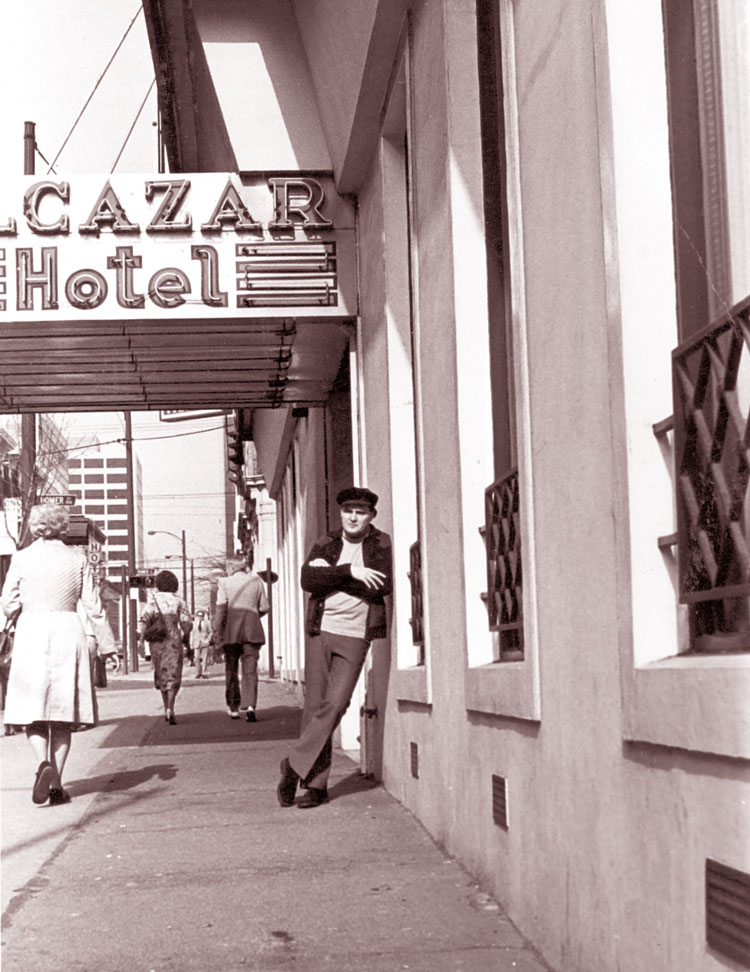
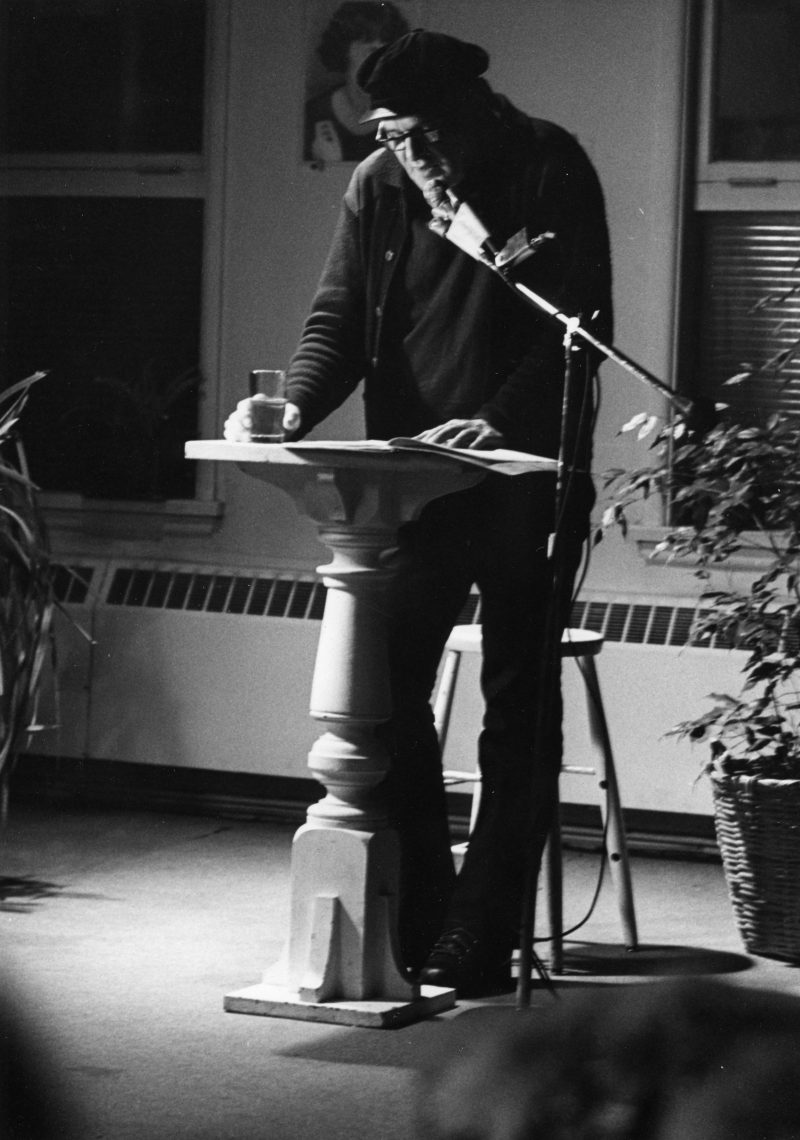
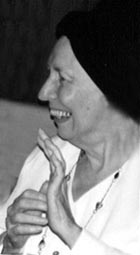
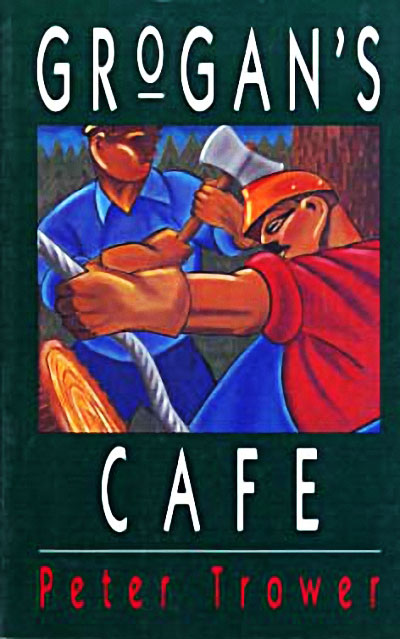
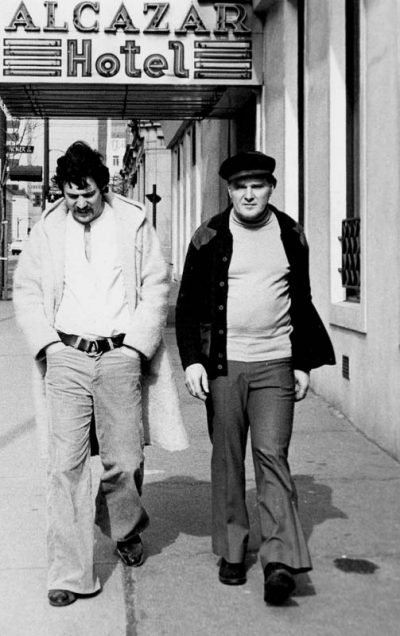
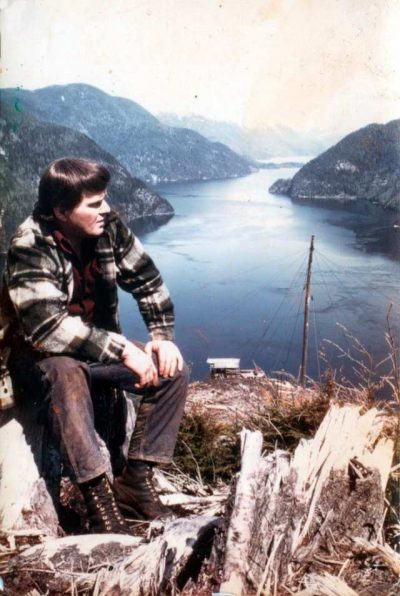

“My Thoughts Swim After You”–lovely, it brought tears to my eyes. It’s what real love is like.
I will miss the memorial but more sadly miss Pete, his presence on the ferry, always a reliable yarn-spinner to fill the 40 minute sail. I’ll miss spotting him with Jim Christy in lower G, miss the opportunity to read on the same bill again. I first became aware of him in Howie White’s Raincoast Chronicles.It was thrilling to see that incarnation of our own coastal literature, to which Pete was such a tireless contributor. Glad to have met. You can put that umbrella down now.
So sorry to hear of Peter Trower\’s passing – but his poems will long survive him. He was one of a kind: a wonderfully authentic voice in Canadian literature. I will never forget the encouragement Pete and Howie White gave me (as a fellow \”logger poet\”) with my first book some 40 years ago. Terrific to hear his home town of Gibson\’s named a lane after him, it must have delighted him.
Farewell Peter – now for you to reunite with dear Yvonne
Peter Trower was a classmate of mine in grade eight or nine in Elphinstone High School, Gibson’s Landing, in 1944-45. I remember the school as having a total of nine students; four of them went on to be published writers: Peter Trower, Yvonne Mearns Klan, Florence Kimball Tindall, and me, Mary Razzell. Our teacher was A.S. Truman. English was his least favourite subject to teach, yet we must have learned something. I think the isolation and the rain helped us to live in our imagination. I’m going to miss Peter, dear old friend.
Mary Slinn Nicol
Ah, Peter.. my bunkhouse bozo buddy… going to miss you and your snarly wit… you might never have made it as a cartoonist but, man, you drew word pictures of your world… our world… the world of the workies, the ones whose history is revealed in the callouses and the gnarled or even missing fingers…
Rest easy, sweet one… you did your job and you did it well. I hope it’s true “there’s pie in the sky”, and my wish for you is you get your share… for breakfast, lunch, and supper, too…
We’re made less by your loss. We were made more by your presence.
One thing about Peter\’s writing that no one seems to mention is the sociological insights of his stories and poems. All his novels express the era he writes about vividly, especially when writing about the East Side: the rooming houses, beer parlours, after-hours clubs, gangs were dead on. But most of all in his poems and novels it\’s the characters that strike you. The Fat man, the Popcorn man, Runway Jill , Granddaddy Tough and all the others come to life like reincarnated spirits from the dead.
Pete was one of a kind and a great writer of British Columbian culture. Those who knew him will miss him dearly.
Thank you, Peter, for sharing your life, poetry and strong truth with …honoring your rich life, you enriched ours, rest well.
I really became aware of Peter Trower when he toured with a group of Logger Poets, story tellers and musicians in and around 1993, called ‘Caulked Boots & Marlin Spikes,’ where he performed with the likes of Bob Swanson, Howard White (Frank White as well?), Bill Moore, Bus Griffiths, and Roy Ashdowne.
In preparation for the Gibsons Sea Cavalcade in the early 2000’s, I again met Peter in preparing the Loggers Sports show and wanting to have some loggers poetry and music for the event. Peter was very supportive in offering his materials for this. It was a pleasure to sit and chat with him at his home that day.
I started out in isolated logging camps back in 1976 as a chokerman before becoming a forestry engineer later on, but still living in camps and spending up to 3 months straight before coming out on a few occassions. Peter’s stories resonate so well with how the loggers culture continued on and the hardships that the lifesyle exerted on them and their distant families.
Thank you Peter and your friends and family for sharing Peter’s life! His stories and poetry will live on with us.
I live in the house in England where in 1935 the unhappy Peter was spending his early years when his father tragically died. In this last year I have traced, discovered and admired Peter and his work and am so glad I was able to write to him to assure him that the ghosts of his past were here no longer. Peter – please rest in peace.
Alders and mountains and listeners will remember you, Pete. Rest well.